|
|
|
Sort Order |
|
|
|
Items / Page
|
|
|
|
|
|
|
| Srl | Item |
| 1 |
ID:
133550
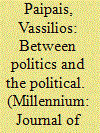

|
|
|
|
|
| Publication |
2014.
|
| Summary/Abstract |
This article situates H. Morgenthau's thought in the context of post-foundationalist theorisations of the difference between politics and the political. In doing so, it shows how Morgenthau's sophisticated realism refused to circumscribe the antagonistic dimension of politics and introduced the study of international politics as a struggle with negativity, temporality and contingency in the wake of the crisis of foundationalism in late modernity. Morgenthau's tarrying with the negative is primarily revealed in his irresolvable tragic oscillation between Nietzschean scepticism and Kantian moralism. Nevertheless, due to its antinomic premises, Morgenthau's tragic vision of politics can still be viewed as stopping a step short of its full-blown critical potential. It is not the purpose of this article, however, to award or withhold credentials of criticality but to recast Morgenthau's theory of the political as an instructive, albeit inconclusive, attempt at a post-foundational political ontology. This may, eventually, serve a purpose far broader than restoring classical realism's latent reflexivity; it may prompt an argument about the conditions and challenges involved in practising international theory as a constant critique of depoliticisation.
|
|
|
|
|
|
|
|
|
|
|
|
|
|
|
|
| 2 |
ID:
105865
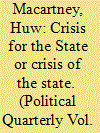

|
|
|
|
|
| Publication |
2011.
|
| Summary/Abstract |
The Conservative-Liberal Democrat government's policy risks turning the financial crisis into a crisis of the state. This article argues that the current trajectory of the British state risks exacerbating the very social antagonisms which it has fought so hard to contain in recent years. It contends that the crisis (2007-09) was a crisis of neoliberalism and yet, paradoxically, neoliberalism-in the form of further depoliticisation and a new politics of debt-is being re-invoked to deal with the post-apocalyptic condition of the British economy. The article suggests that the state lacks the necessary political discourse to secure popular consent and-as a result-is resorting to a more coercive form of political management; and that the effects of austerity are being offset through an increased indebtedness of the British public. Both risk igniting social conflict. In the conclusion several points are indicated for an alternative political agenda.
|
|
|
|
|
|
|
|
|
|
|
|
|
|
|
|
| 3 |
ID:
091436
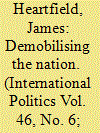

|
|
|
|
|
| Publication |
2009.
|
| Summary/Abstract |
Sovereignty is the subject of considerable debate in both International Relations (IR) theory and European Union (EU) studies. In IR, debate is oriented around the extent to which sovereignty constitutes the building block - or generative grammar - of international order. In EU studies, inter-governmentalists and integrationalists differ over how, why and to what extent European states are pooling or derogating sovereignty to supra-national institutions. This article makes no claim to resolving these debates. Rather, it works within them in order to examine the ways in which the exercise of sovereignty is becoming increasingly problematic, particularly in Western Europe. Specifically, it is argued, because of the failure of domestic political processes, European states are frustrated in terms of their international actions. This diminution of sovereignty provides the integration process with a veneer of dynamism as European institutions fill the vacuum left by demobilising nation-states.
|
|
|
|
|
|
|
|
|
|
|
|
|
|
|
|
| 4 |
ID:
161271
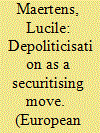

|
|
|
|
|
| Summary/Abstract |
Created in 1972, the United Nations Environment Programme (UNEP) has a normative mandate to promote the protection of the environment at the international level. However, since 1999, the organisation has been conducting field assessments in postconflict situations and addressing the role of natural resources in conflict, framing the environment as a security issue. To do so, the programme insists on its neutrality as a technical and ‘apolitical’ actor within the UN system. Considering depoliticisation as a political act, this article unpacks the concrete practices by which international organisations (IOs) enact depoliticisation. It further argues that IOs can perform securitising moves through practices and techniques presented as outside of the political realm. It draws upon the recent work on depoliticisation at the international level and reinforces studies considering the links between (de)politicisation and securitisation.
|
|
|
|
|
|
|
|
|
|
|
|
|
|
|
|
| 5 |
ID:
121115
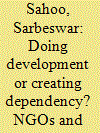

|
|
|
|
|
| Publication |
2013.
|
| Summary/Abstract |
This paper examines the role of non-government organisations (NGOs) and the implications for democratisation in India. By analysing one such organisation, this paper argues that NGOs do not always contribute positively to the democratisation process. It shows how Seva Mandir, an NGO working in the tribal areas of Rajasthan, has adopted a purely technocratic and apolitical service delivery approach and promoted a neo-liberal model of development. The unintended consequence of promoting this model has been the growth of a culture of 'organised dependency' at the grass-roots level, which has adversely affected the larger objectives of empowerment and democratisation.
|
|
|
|
|
|
|
|
|
|
|
|
|
|
|
|
| 6 |
ID:
164825
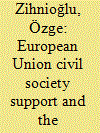

|
|
|
|
|
| Summary/Abstract |
Despite growing critical literature on external funding, the link between EU funding to Turkish civil society organisations (CSOs) and their depoliticisation remains understudied. This article fills this gap. This article explores EU funds in Turkey and shows the incentives it creates for a depoliticised civil society. Drawing on an original set of interviews with 45 CSOs, this article analyses how Turkish CSOs interact with EU funding and how this support impacts on Turkish civil society. This article argues that EU funding’s short-term, activity-based, measurable outcome and visibility-oriented structure contributed to the depoliticisation of those CSOs benefited from EU funds.
|
|
|
|
|
|
|
|
|
|
|
|
|
|
|
|
| 7 |
ID:
118235
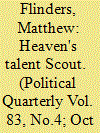

|
|
|
|
|
| Publication |
2012.
|
| Summary/Abstract |
In the last decade the role of the Prime Minister in the process for making senior Church appointments has changed significantly. The man who replaces Dr Rowan Williams-and it will be a man-will be appointed through a procedure in which the Prime Minister is expected to enjoy no choice but to simply confirm the Church of England's preferred candidate. The aim of this article is to draw upon fresh empirical research in order to explore why and how the politics and governance of ecclesiastical patronage has been recalibrated in this way. More importantly this article seeks to embed the study of ecclesiastical patronage within a much broader appreciation of how other forms of ministerial patronage have also become tightly constrained. This, in itself, forges a connection between the role of politicians in senior Church appointments, on the one hand, and a much richer and broader seam of research and writing that poses distinct questions about the nature of modern governance, the benefits of depoliticisation, the accountability of appointment commissions, the capacity of politicians and the future of democracy.
|
|
|
|
|
|
|
|
|
|
|
|
|
|
|
|
| 8 |
ID:
118211
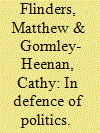

|
|
|
|
|
| Publication |
2012.
|
| Summary/Abstract |
In a world that is increasingly dominated by literary hyperbole there can be no doubt that Bernard Crick's In Defence of Politics remains a classic text. Classic not just in the sense that it provides a masterly account of the essence, meaning and fragility of democratic politics but classic in the sense that it is written with a style, verve and passion that is rarely found within political science. If the test of pretensions to 'a classic' status is that a book defies the passage of time in terms of significance and argument then Crick's Defence would also make the grade for the simple fact that its arguments remain arguably far more important today than they were when they were first published exactly fifty years ago. This article reflects on the contemporary significance of Crick's Defence by defending politics against an updated set of adversaries in the form of: public expectations, marketisation, depoliticisation, the media, and crises before locating the book within the contours of current debates about public disengagement, the rise of 'disaffected democrats' and questions concerning the future and relevance of political science.
|
|
|
|
|
|
|
|
|
|
|
|
|
|
|
|
| 9 |
ID:
099085
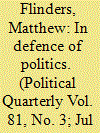

|
|
|
|
|
| Publication |
2010.
|
| Summary/Abstract |
In this, my inaugural lecture, I wanted to sing out in praise of politics! This seemed such a good idea twelve months ago, but now in the wake of even more stories about MPs not declaring foreign trips and former ministers demanding 'cash for access' the idea of trying to defend politicians and praise politics suddenly seems like a very bad idea. And yet it is exactly because politics is held in such low esteem that the lecture is so important. Democratic politics matters because it achieves far more than we generally give it credit for. I want to rediscover the essence and arguments of Bernard Crick's classic book In Defence of Politics because its arguments are more appropriate today than when they were first published in 1962.
|
|
|
|
|
|
|
|
|
|
|
|
|
|
|
|
| 10 |
ID:
090692
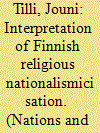

|
|
|
|
|
| Publication |
2009.
|
| Summary/Abstract |
The topic of this article is the relation between 'politicality' and theology in the discourse of Finnish religious nationalism during the Winter War of 1939-40 and the Continuation War of 1941-44. I shall draw on the ideas of Kari Palonen and Anthony D. Smith in attempting to thematise theological depoliticisation as an intrinsic element of religious nationalism. Also, I will elaborate its political significance in the Finnish context, where the role of traditional religion in the general development of nationalist thought has been particularly important. The specific focus is on how prominent representatives of the Finnish clergy related to war and nationalist claims in general. My interpretation is that their arguments were drawn from what I call the topoi of theological depoliticisation, which, at the same time, rendered the discourse extremely political.
|
|
|
|
|
|
|
|
|
|
|
|
|
|
|
|
| 11 |
ID:
140971
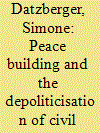

|
|
|
|
|
| Summary/Abstract |
Over the past two decades there has been a rapid increase in funds for local civil society actors in fragile states. Current peace-building and development efforts strive for the recreation of a vibrant, active and ‘liberal’ civil society. In the case of Sierra Leone, paradoxically, this growing support has not strengthened civil society actors based on that liberal idea(l). Instead of experiencing enhanced proactive participation stemming from the civil sphere, Sierra Leone’s civil society appears to be largely depoliticised. Drawing on empirical data gathered over the past four years, this article offers three interrelated causal explanations of why this phenomenon occurred during the country’s peace-building phase from 2002 to 2013. First, Sierra Leone’s civil society landscape has become instrumentalised to serve a broader liberal peace-building and development agenda in several ways. Second, Western idea(l)s of participatory approaches and democracy are repeatedly challenged by the legacies of colonial rule and socially entrenched forms of neo-patrimonialism. Third, abject poverty and the lack of education affect activism and agency from below.
|
|
|
|
|
|
|
|
|
|
|
|
|
|
|
|
| 12 |
ID:
179317
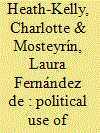

|
|
|
|
|
| Summary/Abstract |
Victims have become a topic of scholarly debate in conflict studies, especially regarding the impact of their activism on the evolution and termination of violence. Victims of terrorism are now enlisted within counter-terrorism, given their moral authority as spokespeople for counter-narratives and de-escalation. Our research explores how Spanish terrorism victims’ associations have evolved across eras of political violence and how they mediate the translation of international War on Terror discourses into Spanish counter-terrorism. We offer a topography of how the War on Terror has opened a ‘social front’ in Spanish counter-terrorism, with Spanish political elites prominently employing the victims’ associations to this end. Contemporary terrorism discourses are read back onto the memory of ETA, with victims’ associations assisting the equation of ETA with al-Qaeda and ISIS. Collective memory of the defeat of ETA has also contributed the veneer of ‘lessons learned’ to contemporary counter-terrorism measures. Our research explores the fluidity of terrorism-memory and the importation of global terrorism discourses into Spanish politics, relying upon interviews with key stakeholders in victims’ associations, local politics, and the research director of the new Victims of Terrorism Memorial Centre in Vitoria.
|
|
|
|
|
|
|
|
|
|
|
|
|
|
|
|
| 13 |
ID:
139775
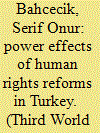

|
|
|
|
|
| Summary/Abstract |
While the perspective of ‘liberalism of fear’ assumes that human rights limit the despotic power of the state, this paper argues that human rights reforms promoted in the context of institution- and capacity-building programmes have had significant power effects by enhancing the disciplinary capacities of the Turkish state and blunting the transformative potential of rights claiming. The reforms increased state surveillance by rechanneling criminal justice processes towards producing evidence (such as telecommunications data, DNA collection, etc) rather than testimonies. Instead of limiting state power, these reforms enhanced the disciplinary mechanisms of social control. They depoliticised the problem of torture by constructing it as an occupational accident (as opposed to a state crime) that happens because of lack of police officer know-how or resources for the investigation of crime. Finally, reforms revamped the way police investigated crimes, rather than launching campaigns against torture and dismissing past wrongdoers in the police. The paper concludes that the neoliberal emphasis on the technicalisation of political problems has limited the democratic potential of human rights reforms.
|
|
|
|
|
|
|
|
|
|
|
|
|
|
|
|
| 14 |
ID:
108497
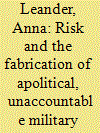

|
|
|
|
|
| Publication |
2011.
|
| Summary/Abstract |
This article argues that risk is central in (re)producing the unaccountable commercial military/security markets that are a normal part of our political reality. The argument is twofold: first it is suggested that risk rationalities and the associated 'preventive imperative' has a depoliticising effect - accentuated by the impersonal spread of risk rationalities and the strategies of risk professionals - which lowers the eagerness to seek accountability. However, and second, depoliticisation is significant above all as a serious obstacle to the innovative thinking that is the sine qua non of effective accountability. The enmeshed, 'hybrid', nature of the market places it in the 'blind spot' of law and is as such fundamental to the current lack of accountability. Consequently, moving beyond established regulatory frameworks and technical understandings of accountability (that is, politicising the market) is a precondition for more effective accountability. Failing to do so, will leave the current rapid legal innovation impotent while reinforcing impunity as the focus on and confidence in established regulatory frameworks grows. The failure to politicise creates an 'accountability paradox' where the pursuit of accountability diminishes it. The article develops this argument with reference to Blackwater's (now Xe) role in the so called CIA 'Killing Program'.
|
|
|
|
|
|
|
|
|
|
|
|
|
|
|
|
| 15 |
ID:
168822


|
|
|
|
|
| Summary/Abstract |
Over the last several decades, new forms of targeted market development have been embraced as solutions to uneven development and market failures. The popular model of inclusive ‘value chain development’ aims to harness markets to address broader development agendas by means of pro-active, micro-market engineering by development experts. This paper examines how inclusive market-making interventions touch down in an agrarian district in Nepal. It focuses on the role of ‘development brokers’ who are enrolled as market engineers and charged with mediating the tensions between profit-oriented market logics and pro-poor goals. The paper argues that even as value chain development aims to depoliticise market failures, the new forms of state–market–society encounters entailed in market-making can also work to bring markets into view as objects of political practice.
|
|
|
|
|
|
|
|
|
|
|
|
|
|
|
|
| 16 |
ID:
113854
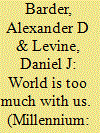

|
|
|
|
|
| Publication |
2012.
|
| Summary/Abstract |
International Relations' constructivist turn - that body of approaches emerging in the late 1980s/early 1990s in which international outcomes were held to be predicated upon complex social arrangements, rules, norms, institutions, language and culture - emerged from a unique historical and intellectual moment. Initially, this theoretical turn was deeply committed to reflexivity and circumspection: since events were held to be contingent and theorists were bound up in them, the obligation to sustained critical self-reflection was central to the project. That commitment would not last, however. By the mid-1990s, it had given way to a 'middle ground' (or via media) position, which aligned itself with dominant materialist and rationalist methodologies and epistemologies. We wish to examine that moment of realignment: how it happened, and what it might mean. We argue that having imbibed a degree of the free-floating optimism that was 'in the air' in the 1990s, via media constructivism's leading scholars came to believe that it was no longer necessary to problematise the historicity and contingency of their own historical moment and philosophical horizons. The post-Cold War 'world', we hold - or, at any rate, one account of it - was 'too much with' via media constructivism: selectively constraining its reflexive impulses and critical tools in ways that, however unintentionally, provided cover for particular normative and ideological configurations. To move past this, we argue that via media constructivists need a sustainably critical ethos: one which 'repoliticises' international theory by unmasking its hidden ideological and political starting points.
|
|
|
|
|
|
|
|
|
|
|
|
|
|
|
|
|
|
|
|
|